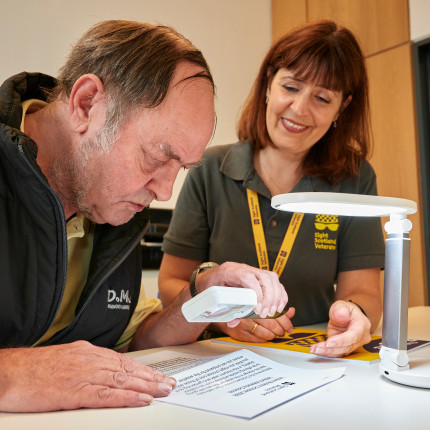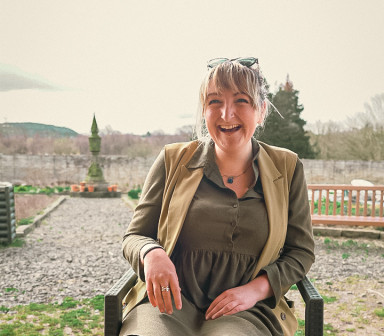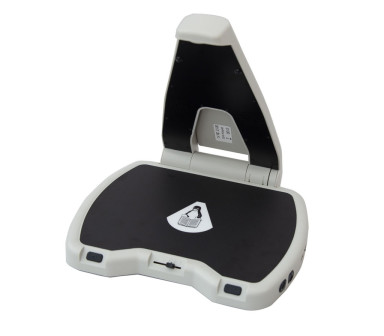There’s a flood of emotions involved in dealing with losing your eyesight.
Losing your eyesight can feel like losing someone close to you. It may be hard to cope after being diagnosed with conditions like cataracts, glaucoma or age-related macular degeneration. For some, these conditions can pose serious challenges to living day to day, let alone living a full life.
It can be especially devastating for veterans of the Armed Forces who, because of their experience serving in the military, see themselves as fit, healthy and more than capable of taking care of themselves and others.
“They defend our country and preserve our independence. They maintain the wellbeing of civilians and now they’re relying on civilians to support them. That is quite difficult,” says Kate White, a rehabilitation officer on low vision at Sight Scotland Veterans.

What it’s like to lose your eyesight?
Kate has been working for the charity for about four years now. Over that time, she has seen the struggles that veterans face as they come to terms with losing their eyesight. They feel a whole range of emotions from fear to frustration to anger.
It’s similar to the experience of bereavement as described by Swiss-American psychiatrist Elisabeth Kubler-Ross. To explain reactions to change and loss, the Kubler-Ross model identifies five stages of grief:
Denial
It may be so hard to take the news of losing your eyesight that you would not believe it at all. It’s a common reaction to try to block it out, to think there’s been a mistake and to continue living just as you’ve always had. This is a defense mechanism that helps to stop you from feeling overwhelmed.
Anger
This may be triggered by the simplest things, like spilling coffee. You can fly into a rage because of the people around you, even family, friends or others who are trying to help such as your doctor. It’s natural, especially if you lose your sight suddenly, like in an accident.
Bargaining
This happens when you keep thinking of the past and the things you could have done differently. This comes when you try to gain control of a situation that cannot be changed. You start to think that you will feel better if you behave in certain ways.
Depression
You may find yourself crying inconsolably. It may be hard to concentrate, eat normally, go to sleep or to get up. If you feel you can’t get on with life normally, try and seek professional help.
Acceptance
This entails recognising what has happened and being open to the right kind of adjustments so you can continue living your life. It means managing a new sense of self and being ready to discover new interests and possibilities.
A non-linear process
Kate however explains, it’s not a linear process. “It’s not stages where you start with denial and then you move to anger. Some people will never ever move out of the first stage. Some will never get past being angry and stay there for the rest of their lives.
“Sometimes you can have all of those emotions in just one day. So it tends to cycle around. If they have a progressive or deterioration of a degenerative condition, then they could start that cycle all over again.
Little wins
Kate says: “We can try and get some sort of positivity out of each stage. Sometimes the early stages like denial and anger can be helped with information or by being a sounding board.
“Maybe when they come along to more of the bargaining aspect and the low mood, we can give them emotional support and start to focus on practical things that we can do to move them into that guided area of acceptance.
“My role as a rehab officer is to look at several components of a person that’s got sight loss. One is to look at their mobility. Next part is looking at their actual ability to see and read because reading is the biggest loss for most people. And then the final part is more of an emotional aspect. A lot of the time we’re doing a lot of emotional sympathetic listening and support. Sometimes we’re just there to signpost and give them an outlet to talk because they’re not ready to move on.
“We do sighted guide training as well with family members and with volunteers so that they are guiding our veterans safely.”
Keeping connections
For Sight Scotland Veterans, it’s important to connect veterans to services and support within their local communities to help them adapt to losing their eyesight.
“To try and link these veterans in with each other, to make them feel less isolated in what they’re going through is really important because they’ve been so used to camaraderie and their unit being their family. It’s amazing the support they give each other. A lot of the time, it’s really just the connections that they want. They just want to know that they’re not alone and they’re really not alone.”
Need support with sight loss?
We support all Veterans with sight loss. For free support get in touch today.

